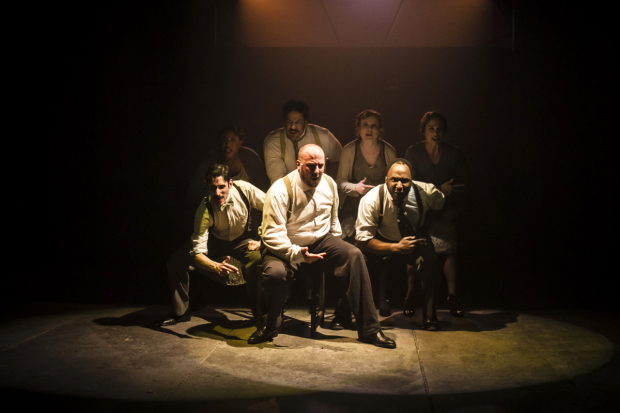Adding Machine: A Musical

(© Matthew Gregory Hollis)
Elmer Rice's 1923 play The Adding Machine, inspired heavily by the Expressionist movement of Weimar Germany, does not outwardly seem like an obvious foundation for a musical. However, when a jarringly beautiful score by Joshua Schmidt and a libretto by Schmidt and Jason Loewith are layered in, along with the take-no-prisoners aesthetic of the Hypocrites, you get a one-act production well worth seeing.
Mr. Zero (Patrick Du Laney) is not a traditional musical-theater leading man. He is cowardly, weak-willed, and fairly stupid. He is married to a woman he despises (Kelli Harrington), and trapped in the endless repetition of his number-crunching job at a nameless company. On the 25th anniversary of his employment, Mr. Zero's Boss (Andres Enriquez) keeps him after work to explain that he will be replaced by an adding machine.
To make matters worse, Mr. Zero is now late to his wife's dinner party with the Ones (Jonah D. Winston and Laura McClain) and the Twos (John Taflan and Tyler Brown). Desperate and full of self-pity, Mr. Zero staggers his way through Mrs. Zero's party, as well as a murder, incarceration, execution, a visit to Elysian Fields, and a revelation about the ultimate fate of mankind, all of which are jam-packed into a 95-minute show.
Patrick Du Laney is an excellent Mr. Zero, despite seeming almost too young and vital for the role. Though his voice is not showcased until the middle of the show, it is strong and soulful. As Mrs. Zero, Harrington nags, brays, and begs with an exquisite, steely voice. Zero's prison cellmate Shrdlu (Bear Bellinger) commands the stage in an extended sequence that drags on a few minutes too long, a rare misstep in this carefully paced show.
Joshua Schmidt's rhythmic and dissonant score is appropriately unsettling, echoing itself mechanically as Mr. Zero's life grinds on. The dream sequences are more traditionally sung, most notably "I'd Rather Watch You," a knockout torch song performed by Mr. Zero's bashful coworker Daisy (the delightful Neala Barron).
Set designer Lauren Nigiri has created prisons — the literal kind made of brick and dark metal, and the figurative kind created by a hazy, endlessly bleak feel. Even her take on Elysian Fields, the land of eternal rest, is amusingly soulless and artificial. The cast putters around in drab, ill-fitting clothing, an appropriately expressionistic choice by costume designer Izumi Inaba. Co-sound designers Joe Court and Brandon Reed produced a soundscape that, while evocative, sometimes seems too large for the space. The lighting design by Mike Durst occasionally veers too far into camp, with hidden LEDs and colorful bursts that don't quite succeed in setting the tone.
In typical Hypocrites fashion, the ensemble is used to great effect. Geoff Button's direction emphasizes mankind's place in the machine, casting the members of the chorus as a coatrack, a clock, and mindless afterlife attendees. When they are playing human beings, the cast is alternately hunched over and muttering, or smiling with empty eyes — either way, nobody really looks at anybody else. Katie Spelman's choreography blends in and out seamlessly and continues the mechanical theme.
Schmidt & Loewith's musical adaptation is a thoughtful examination of Elmer Rice's themes, and an excellent match for the Hypocrites' unique aesthetic. Mr. Zero's fate is as present a fear in 2016 as it was in 1923: You give the best years of your life to a corporation and carve out a path for yourself, only to be replaced by a machine.











